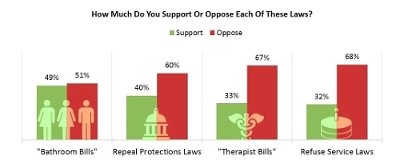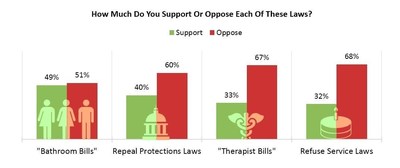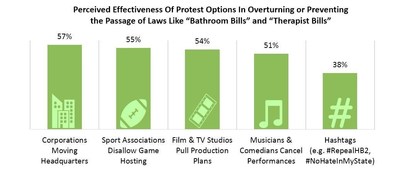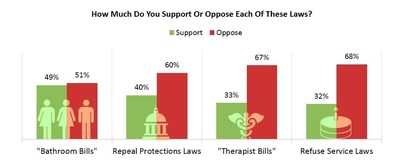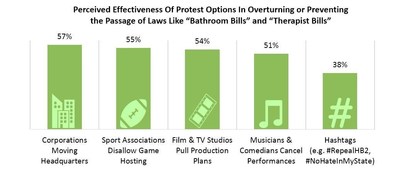By The Harris Poll, Special for USDR
The news in recent months has been filled with coverage of new laws being proposed and/or passed in many American states in an attempt to preserve religious rights or individuals’ safety at the possible expense of lesbian, gay, bisexual, and transgender rights. When asked about their familiarity with some of these laws, most Americans proved to be “in the know” about three out of the four laws tested:
- Three quarters of Americans (76%) are familiar with “Bathroom Bills” – laws that require individuals to use the bathroom that corresponds to their sex at birth;
- Six in ten (60%) are familiar with laws allowing businesses to refuse service to LGBT persons because of religious objections;
- Over half (55%) are familiar with new state laws that repeal, or overturn, local/city LGBT anti-discrimination laws and ban cities from passing similar laws in the future; and,
- Three in ten (30%) are familiar with “Therapist Bills” – laws that allow therapists and counselors with “sincerely held beliefs” to turn away LGBT patients.
Pro or con?
Harris Poll
Though they may seem to be a localized issue for the moment, roughly equal proportions of adults across all regions in the country are aware of these laws some states are proposing/passing.
These are some of the results of The Harris Poll® of 1,424 general population U.S. adults surveyed online between May 11 and 13, 2016. Complete results of this study can be found here.
Pro or con?
Americans are about evenly split in their support of “Bathroom Bills,” with 49% supporting and 51% opposing. For each of the other laws tested, however, clear majorities are in opposition.
Though there is no consensus on support for the Bathroom Bills, over three fifths of Americans agree on one possible solution: 62% feel all public buildings should be required to offer a single-user or gender-nonspecific bathroom.
Protest familiarity
With so many conflicting opinions out there, many are rising in protest against laws like “Bathroom Bills” and “Therapist Bills.” Six in ten Americans (60%) are familiar with the recent movement of musicians and comedians canceling concerts in states with these laws, while around four in ten each are familiar with:
- Film and television studios pulling current and/or future projects out of states with these laws (44%);
- Corporations moving their headquarters and/or offices out of states with these laws (42%); and,
- Sporting associations planning to disallow states with these laws from hosting major games (42%).
In addition, about one in three adults (32%) are aware of the hashtags being used on social media to voice discontent with these laws, such as #RepealHB2, #NoHateInMyState, and #WeAreNotThis.
Protest effectiveness
The survey reveals that nearly six in ten Americans (57%) believes companies taking their business out of these states will be effective in making a difference, while less than four in ten (38%) have the same confidence in the various hashtags on social media.
But just because only about half of Americans (51%) believe musicians and comedians canceling concerts will be effective in helping prevent or overturn these laws, doesn’t mean Americans don’t support the effort:
- Six in ten (60%) support musicians who advocate for the LGBT community;
- Half (50%) agree that if an artist whose concert they wanted to attend cancelled the show in protest of laws like the “Bathroom Bills,” they would try to attend in another venue instead; and,
- Over seven in ten said they would be more or equally as likely to support artists (73%), listen to their music (75%), buy their albums (73%), and attend their concerts (72%).
“We’re seeing that artists who advocate for the LGBT community have majority support from the American public,” says Matt Yazge, Director of Brand Partnerships at Nielsen Music. “LGBT music fans – and, just as importantly, their allies — are willing to reward these artists for their active support of the LGBT community.”
To see other recent Harris Polls, please visit our website, TheHarrisPoll.com.
Want Harris Polls delivered direct to your inbox? Click here!
Methodology
This Harris Poll was conducted online within the United States between May 11 and 13, 2016 among 1,424 adults (aged 18 and over). Figures for age, sex, race/ethnicity, education, region and household income were weighted where necessary to bring them into line with their actual proportions in the population. Propensity score weighting was also used to adjust for respondents’ propensity to be online.
All sample surveys and polls, whether or not they use probability sampling, are subject to multiple sources of error which are most often not possible to quantify or estimate, including sampling error, coverage error, error associated with nonresponse, error associated with question wording and response options, and post-survey weighting and adjustments. Therefore, The Harris Poll avoids the words “margin of error” as they are misleading. All that can be calculated are different possible sampling errors with different probabilities for pure, unweighted, random samples with 100% response rates. These are only theoretical because no published polls come close to this ideal.
Respondents for this survey were selected from among those who have agreed to participate in Harris Poll surveys. The data have been weighted to reflect the composition of the adult population. Because the sample is based on those who agreed to participate in our panel, no estimates of theoretical sampling error can be calculated.
These statements conform to the principles of disclosure of the National Council on Public Polls.
The results of this Harris Poll may not be used in advertising, marketing or promotion without the prior written permission of The Harris Poll.
Product and brand names are trademarks or registered trademarks of their respective owners.
The Harris Poll® #38, May 19, 2016
By Hannah Pollack, Research Analyst, The Harris Poll
About The Harris Poll®
Begun in 1963, The Harris Poll is one of the longest running surveys measuring public opinion in the U.S. and is highly regarded throughout the world. The nationally representative polls, conducted primarily online, measure the knowledge, opinions, behaviors and motivations of the general public. New and trended polls on a wide variety of subjects including politics, the economy, healthcare, foreign affairs, science and technology, sports and entertainment, and lifestyles are published weekly. For more information, or to see other recent polls, please visit our new website, TheHarrisPoll.com.
SOURCE The Harris Poll

